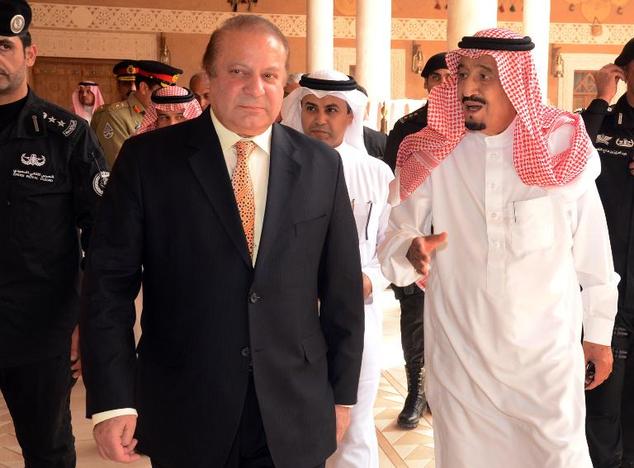
The latest crisis stems from mounting tension between Qatar and the rest of the GCC and resulted in the blockade when Saudis along with the rest of the GCC and Egypt accused Qatar of financing terror outfits in the Middle East and meddling in the internal affairs of its neighbours. The accusations were met with counter-accusations and soon the crisis escalated into what is now being referred to as a “potentially years-long rift.” As expected, the crisis evoked responses across the international community with clear lines often being drawn and sides being taken by major influencers such as the US.
In this environment of searing tension and real time developments, Pakistan is also expected to take sides. Ties between the Gulf, including Qatar, and Pakistan are classified as “brotherly,” and are based on energy supplies, trade routes, billions of dollars’ worth of bilateral trade alongside a shared sense of history and vision. Pakistan therefore simply cannot afford to alienate any of its gulf allies. This is where, perhaps, one of the most successful aspects of Islamabad’s foreign policy comes into play. For most of its history now, Pakistan has adopted a policy of non-alignment in international conflicts involving predominantly Muslim states. It has never been so important that this policy prevails now, because the number of conflicts involving the Muslim states has never been so high and their intensity never so extreme.
With regional tensions and international agendas clashing, the Middle East has become a hotbed of conflicts, almost all of them involving two or more Muslim states. Pakistan’s manoeuvring of these clashes has been in line with its long held policy on the matter. Case in point: Syria. The Syrian conflict is host to an alarmingly high number of international stakeholders, which has not only contributed to the unprecedented internationalised mudding up of an internal conflict, but has also resulted in the development of previously non-existent tensions between international players that got dragged into Syria. And yet as most of the influential international community dived in, Pakistan wisely chose not to engage. The same thing happened in Yemen, where the conflict internationalised overnight, drawing most of the region into it and further entrenching long standing rivalries. Here too, Pakistan implemented its long standing policy of non-alignment.
But Pakistan’s handling of Yemen was starkly different than its handling of Syria. Even as Islamabad successfully rescinded itself from the Yemeni crisis, what was troubling was the increased difficulty of the said recension and thus the increased difficulty of staying non-aligned. Pakistan’s involvement in Yemen came to be debated, even in parliament, and scenarios were entertained which involved significant departures from the country’s policy of non-alignment. With Syria, Pakistan had easily looked the other way; when it came to Yemen, however, this proved much harder to do. Perhaps this was due to the proximity of the conflict. With Syria off in the distance Pakistan easily afforded looking the other way without compromising on long-standing and important alliances with particular Muslim states. But as the conflict moved close to home, the difficulty of maintaining a non-aligned stance was for all to see. Perhaps, if Pakistan had a different internal security and political situation, the nation would have been forced to intervene in one form or another. With rivalries moving eastward from Syria, the pressure on Pakistan to pick favourites was much greater.
And this is why the current Gulf crisis is so important and even more troubling, the tension has now reached Pakistan’s neighbourhood. While it is a much colder and inactive crisis than those in Syria and Yemen, the gravity of the Gulf crisis, especially for Pakistan, is immense. With not just past friendship but future cooperation at stake, the pressure that Islamabad will face from said allies is bound to be more tremendous.
Thus, therein lies the complexity of following non-alignment during the current crisis. The support of a previously non-aligned Pakistan will be invaluable to either of its allies involved in the conflict in winning the ongoing international narrative. The risks and rewards of participation will be massive for Pakistan, providing finally, perhaps, the nudge that was missing during Yemen. The question that is then being asked of Pakistan is, will it be able to stay non-aligned, especially when the crisis has hit the neighbourhood, and if so, how?
The answer is a sustained diplomatic effort instead of the diplomatic withdrawals we saw during Yemen and Syria. Now, however, in the wake of the Gulf crisis, for Pakistan’s well-advised policy of non-alignment to prevail, a monumental and, more importantly, proactive, diplomatic effort will be required from Islamabad.
Pakistan’s diplomatic corps will have to make a case for, not just its lack of desire to pick one side against the other, but also, and more importantly, its inability to intervene in light of a protracted conflict of its own. As one of the increasingly few parties that maintain alliances with both sides in the crisis, Islamabad has the perfect opportunity to not only navigate its way out of the crisis without taking sides, but to further strengthen its current alliances and its policy of non-alignment in such confrontations. Again, this can only be achieved through a sustained diplomatic push that legitimises Pakistan’s policy of non-alignment not as a bystander but as a mediator.
Published in The Express Tribune, July 1st, 2017.
Like Opinion & Editorial on Facebook, follow @ETOpEd on Twitter to receive all updates on all our daily pieces.













COMMENTS (4)
Comments are moderated and generally will be posted if they are on-topic and not abusive.
For more information, please see our Comments FAQ